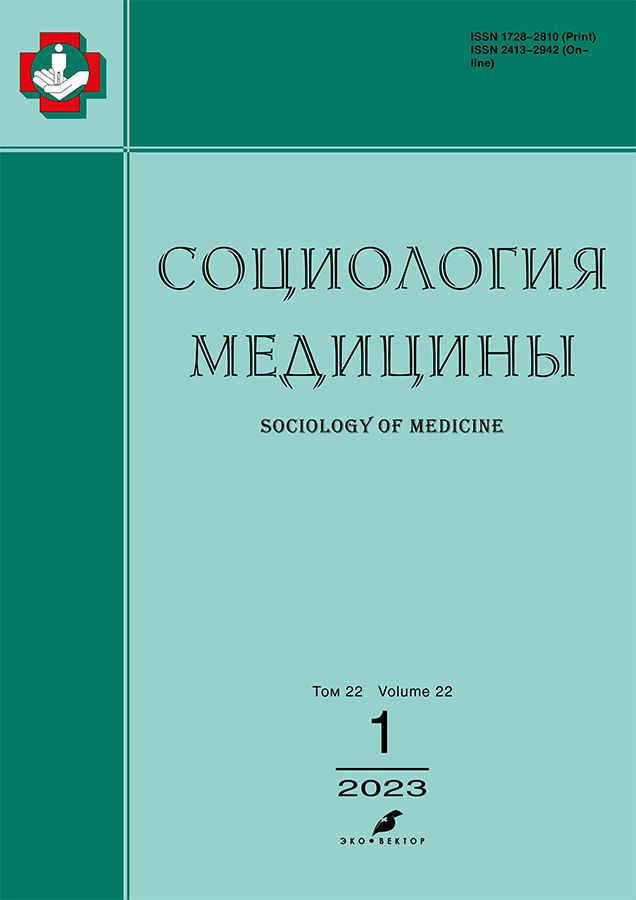Medieval and Renaissance understanding of “body” and “corporeality”
- Authors: Mettini E.1
-
Affiliations:
- Pirogov Russian National Research Medical University
- Issue: Vol 22, No 1 (2023)
- Pages: 41-49
- Section: SOCIOLOGY OF HEALTH AND DISEASE
- URL: https://rjsocmed.com/1728-2810/article/view/100781
- DOI: https://doi.org/10.17816/socm100781
- ID: 100781
Cite item
Abstract
BACKGROUND: The article analyzes the idea that such a concept as “body” is an interesting and complex phenomenon, an integral part of human life, which philosophers, thinkers and theologians have reflected on throughout human history, describing its significance and role depending on ideological attitudes prevailing at one time or another.
AIM: Studying the features of the presentation and reflection of the “dualistic” and “holistic” attitude towards the human body in the works of scientists and thinkers of different eras.
RESULTS: The explanation of the essence of the first approach is based on an analysis of the features of church doctrine, which saw in the body only a “shell” of the soul and considered it worthy of contempt and death, and to understand the essence of the second approach, the author turns to the ideological attitudes of the Late Middle Ages, the Renaissance and the early Modern Times, which “rehabilitated” the body in the context of a return to the Roman and Greek classics of philosophical thought. Consequently, on the one hand, the medieval religious and political ideal of universalism and ways of “healing” (improving) the body as a social unity (“the body of society”) are analyzed, and, on the other hand, the author reflects on ways to free man from the yoke of church authority that regulates every aspect human life, related to the body, and also describes the history of the emergence of a new understanding of the human body — both as a symbol of beauty (in the understanding of kalokagathia by the Greeks), and as a machine working according to certain laws.
CONCLUSION: Understanding how “body” and “corporality” became the guidelines of medieval corporatism in its secular and ecclesiastical (papal) versions (taking into account the duality of the monarch’s body) requires a comprehensive study — not only from a philosophical, psychological, sociological, but also from a medical point of view. Changing approaches to understanding the body as a physical, cultural, social phenomenon allows us to more deeply understand the characteristics of society and people’s attitude towards life and death, suffering of body and soul, as well as the role of public discourse in shaping the population’s attitude towards these phenomena.
Keywords
Full Text
About the authors
Emiliano Mettini
Pirogov Russian National Research Medical University
Author for correspondence.
Email: emiliano@inbox.ru
ORCID iD: 0000-0002-3051-9730
SPIN-code: 5521-9267
PhD, Cand. Sci. (Ped.)
Russian Federation, MoscowReferences
- Bykhovskaya IM. «Homo Corporis» in the socio-cultural context of early Soviet era: axiology and social practices. RSUH/RGGU Bulletin. “Literary Theory. Linguistics. Cultural Studies” Series. 2019;(8 Pt 1):65–82. doi: 10.28995/2686-7249-2019-8-65-82
- Bykhovskaya IM. Corporeality as a sociocultural phenomenon. In: Levit SYa, editor. Cultural studies. The 20th century. Encyclopedia. Saint Petersburg: Universitetskaya kniga; 1997. (In Russ).
- Bakhtin MM. The aesthetics of verbal creativity. 2nd ed. Moscow: Iskusstvo; 1986. (In Russ).
- Foucault M. The will to truth: Beyond knowledge, power and sexuality. Works of different years. Moscow: Kastal'; 1996.
- Losev AF. History of ancient aesthetics. Moscow: AST; 2000. (In Russ).
- Winckelmann JJ. Thoughts on the imitation of Greek works in painting and sculpture (early edition). Moscow: Institute of World History; 1992.
- Platon. Collected works in 4 vol. Vol. 1. Losev AF et al., editors. Moscow: Mysl'; 1990.
- Dobrosel'skii PV. On the origin of man, original sin and artificial procreation. Moscow: Blagovest; 2008. (In Russ).
- Macarius the Great. Spiritual conversations. Moscow: Izd-vo Sretenskogo monastyrya; 2017. (In Russ).
- Le Goff J, Truong N. A history of the body in the Middle Ages. Moscow: Tekst; 2008.
- Duby G. Le chevalier, la femme et le prêtre. Le mariage dans la France féodale. Paris: Hachette; 1981. (In French).
- Horkheimer M, Adorno T. Dialectic of enlightenment. Philosophical fragments. Moscow–Saint Petersburg: Medium, Yuventa; 1997.
- Blok M. Miracle-working kings. A sketch of the ideas about the supernatural character of royal power, predominantly in France and England. Moscow: Yazyki russkoi kul'tury; 1998. (In Russ).
- Kantorovich EKh. The King’s two bodies: A study in medieval political theology. Moscow: Izd-vo Instituta Gaidara; 2014.
- Alighieri D. Monarchy. Moscow: Kanon-press-Ts: Kuchkovo pole; 1999.
- Mynors RAB, Thomson RM, Winterbottom M, editors. William of Malmesbury: Gesta Regum Anglorum, Vol. I. London: Oxford University Press; 1998. doi: 10.1093/actrade/9780198206781.book.1
- Thomson RM, Winterbottom M. William of Malmesbury: Gesta Regum Anglorum, Vol. II: General introduction and commentary. London: Oxford University Press; 2002.
- Frazer JG. The golden bough: A study in magic and religion. In 2 vol. Vol. 1. Moscow: Terra–Knizhnyi klub; 2001.
- Beccarisi A. La teoria dell' intelletto come fondamento di una comunità universale in Meister Eckhart e Dante. In: Beccarisi A, Palazzo A, editors. Per studium et doctrinam, Fonti e testi di filosofia medievale dal XII al XIV secolo. Rome: Aracne Editrice; 2018. P:221–244. (In Italian).
- Alighieri D. De Monarchia [Internet]. Societa Dantesca Italiana [cited 02 November 2022]. Available from: https://www.danteonline.it/monarchia/ (In Lat).
- Alighieri D. Opere minore di Dante Alighieri. Vol. 2. Unione Tipograficoeditrice torinese; 1997. (In Italian).
- Kant I. Critique of pure reason. Moscow: Mysl'; 2018.
- Kant I. Critique of practical reason. Moscow: AST; 2019.
- Plowden E. Commentaries, or Reports. London; 1816.
- Lib.ru: Maksim Moshkow’s Library [Internet]. Shakespeare W. Richard II [cited 02 November 2022]. Available from: http://www.lib.ru/SHAKESPEARE/shks_richard.txt (In Russ).
- Foucault M. Discipline and punish: The birth of the prison. Borisova I, editor. Moscow: Ad Marginem; 1999.
Supplementary files







